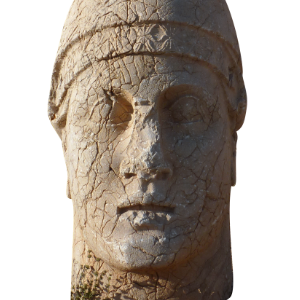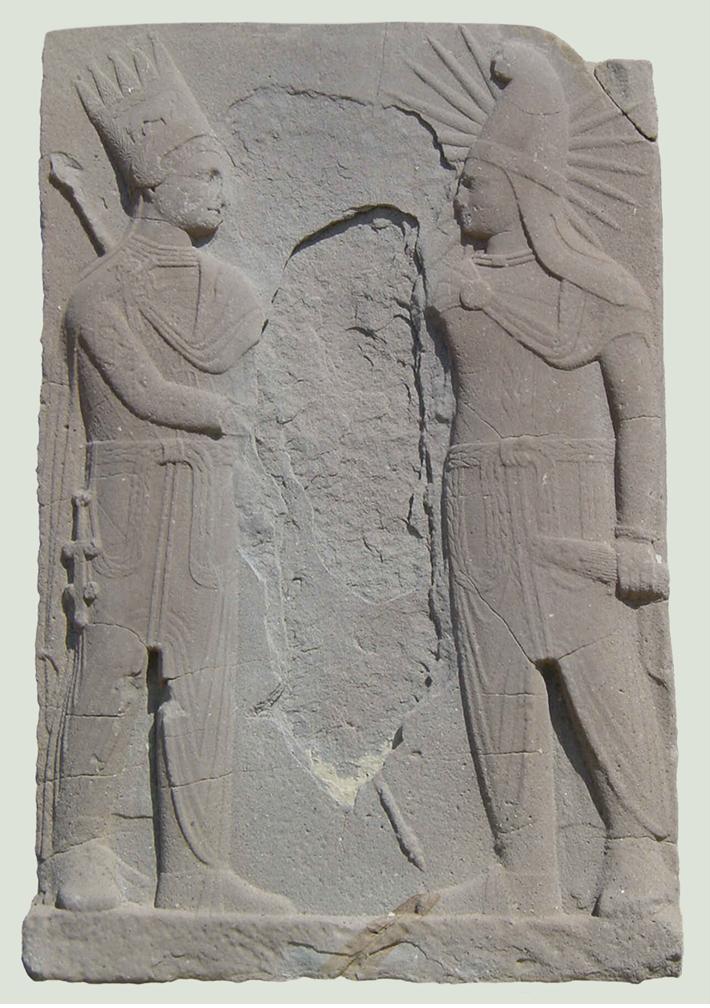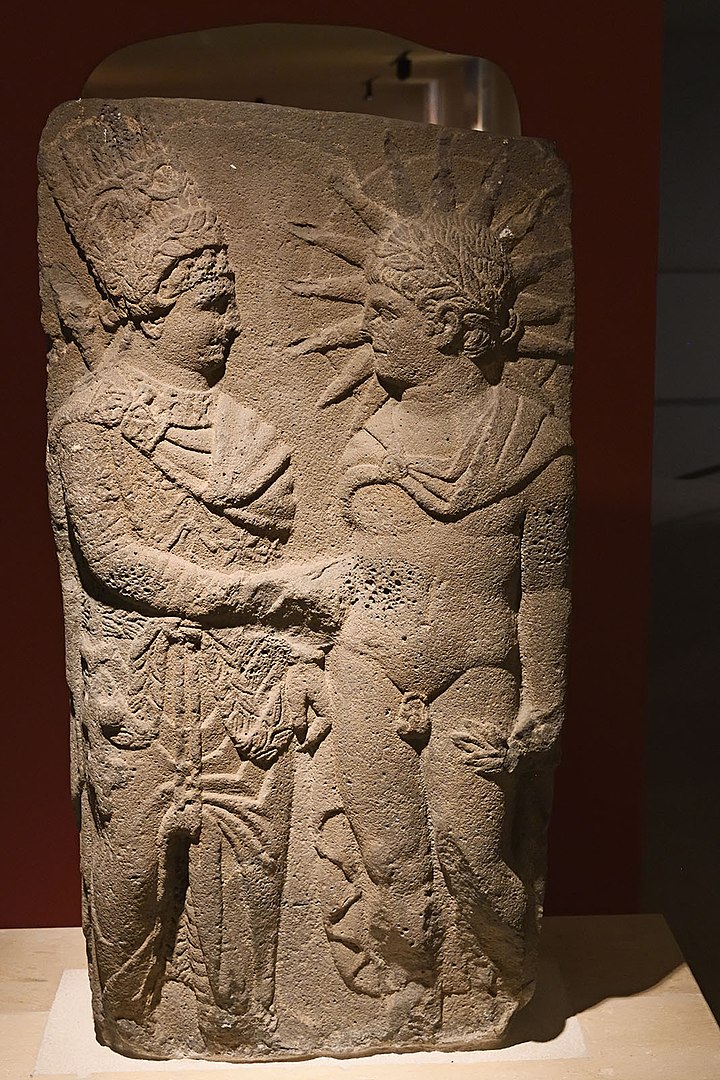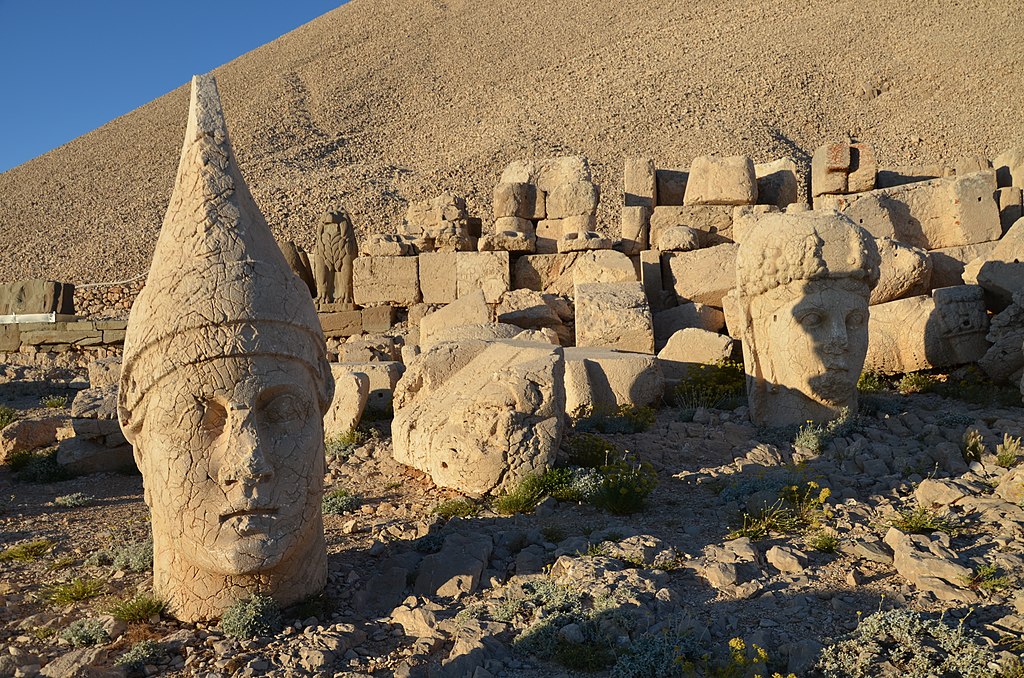
Antiochus I
Antiochus I Theos Dikaios Epiphanes Philorhomaios Philhellen
Alias Ἀντίοχος ὁ Θεὸς Δίκαιος Ἐπιφανὴς Φιλορωμαῖος Φιλέλλην
King of the Greco-Iranian Kingdom of Commagene.
Biography
of Antiochus I
- Antiochus I was probably a syndexios, possibly holding the rank of Pater.
- Active 0001a in Samosata, Syria [TNMM 801].
- Active 65 BC in Ad Enum, Noricum [TNMM 134].
- Active 69 – 36 BC in Commagene, Syria-Coele, Syria [TNMM 556].
- Active in Ad Enum, Noricum [TNMM 110].
TNMP 172
Antiochus I Theos Dikaios Epiphanes Philorhomaios Philhellen (c. 86 - 31 BC), meaning Antiochos, the just, eminent god, friend of Romans and friend of Greeks, was king of the Greco-Iranian Kingdom of Commagene between 70 and 31 BC. He was one of the last rulers of a Persian-Macedonian court before the advent of the Romans.
Antiochus I was the son of king Mithridates I Callinicus and queen Laodice VII Thea of Commagene. He was half Iranian, a distant member of the Orontid Dynasty and half Greek. His father Mithridates was the son of King Sames II Theosebes Dikaios of Commagene. Mithridates was possibly related to the kings of Parthia and, in the light of archaeological discoveries at Mount Nemrut, claimed descent from Orontes and also Darius I of Persia, thanks to Orontes’ marriage to Rhodogune, daughter of Artaxerxes II, who was a descendant of king Darius I.
More certain are his dynastic connections to the Diadochi. Antiochus’s mother, Laodice VII Thea, was a Greek princess of the Seleucid Empire. Laodice’s father was the Seleucid King Antiochus VIII Grypus, while her mother was a Ptolemaic princess and later Seleucid Queen Tryphaena. Thus, Antiochus was a direct descendant of Seleucus I Nicator of the Seleucid Empire, Ptolemy I Soter of Egypt, Antigonus I Monophthalmus of Macedonia and Asia, Lysimachus of Thrace and the Macedonian regent, Antipater. These five men, the Diadochi ’successors’, had served as generals under Alexander the Great. Antiochus’s parents had married as part of a peace alliance between their kingdoms. Little is known of his early life and education, aside from its philhellenic aspect. When his father died in 70 BC, Antiochus succeeded his father as king.
Antiochus married Isias, daughter of King Ariobarzanes I of Cappadocia. They had five children:
- Mithridates II of Commagene succeeded Antiochus as King of Commagene after his death in 31 BC
- Laodice, who married King Orodes II of Parthia
- Prince Antiochus II of Commagene
- Antiochis of Commagene
Commagene was a minor kingdom located in the highlands of northern Syria; to the north, it bordered Cappadocia, while it bordered Osroene to the south. It was initially a vassal state of the Seleucids, where it was considerably Hellenized. In the 1st-century BC, however, Iranian culture experienced a resurgence, intentionally supported by Commagene in order to highlight its ancient ancestry and refute Seleucid, Parthian and Roman claims over the area. Under Antiochus, his kingdom experienced hardships during the Roman war with Pontus and Armenia. Armenia at first managed to extend its influence over Commagene, but Antiochus was ultimately forced to side with the Romans when the commander Pompey declared war against him.
Antiochus claims in his inscription on Mount Nemrut that he was a ’friend of the Romans’ (philoromaios), but was seen with some mistrust by a few of the informants of Roman politician Cicero. His Iranian lineage made him lean toward the Parthian realm. He enjoyed good relations with the king of Media Atropatene, Darius, who seemingly helped him against Pompey. Antiochus made an alliance with the Parthian monarch Orodes II (r. 57–37 BC), which was cemented with Orodes’ marriage to Antiochus’ daughter, Laodice. In 51 BC Antiochus provided Cicero with intelligence of the movements of a Parthian force led by prince Pacorus I. Ultimately Antiochus chose the Parthians over the Romans. In 38 BC, Pacorus was defeated and killed by the Romans; the remnants of his army fled to Commagene, where they took refuge.
The Roman general Publius Ventidius Bassus marched towards Commagene to punish Antiochus for his desertion. He laid siege to the capital Samosata, where Antiochus resided. Antiochus attempted to reach a compromise by offering 1,000 talents as reimbursement and a renewed alliance with the Romans. The Roman commander-in-chief Marcus Antonius declined the offer and had Ventidius’ dismissed, with himself taking over the siege. He was, however, unable to capture the capital, and instead resorted to accept Antiochus’ new offer of 300 talents. The life of Antiochus becomes obscure after this; according to Cassius Dio, he was killed by the Parthian king Phraates IV, in c. 31 BC.
References
- The Trustees of the British Museum (2024) stela | British Museum
- V. W. Yorke (1898) ‘Inscriptions from eastern Asia Minor.’ Journal of Hellenic Studies, XVIII.
Mentions
Antiochus I shakes hands with Mithras
TNMM 134
Antiochus I of Commagene shakes Mithras hands in this relief from the Nemrut Dagi temple.
Antiochus I shakes hands with naked Apollo-Mithras-Helios
TNMM 556
Stele representing Apollo-Mithras-Helios in a Hellenistic nude fashion, shaking hands with Antiochus I.
Head of Antiochus I of Commagene
TNMM 110
This monumental head of Antionchus I of Commagene is in Nemrut Dağı together with other representations of the Greco-Iranian king.
Tablet of Antiochus I from Samsat
TNMM 801
"The remaining figure on this monument, Herakles, was previously misidentified as Apollo on this remarkable black basalt tablet from Samsat, known in Roman times as Samosata.
Διὸς τε Ῥωμαίου καὶ Ἀπόλλωνος Μίθρου Ἡλίου Ἑρ-
μοῦ καὶ Ἀρτέμιδος Ἡρακλέους Ἄρεως, καὶ ποιη-
σάμενος παλαιᾶς δυνάμεως [καὶ τύχης νέας τῆς ἐ]-
μῆς ἡλικίας θεῶν μεγάλων [τὴν ἀρχαίαν τιμήν]
ἐν ἱεροῖς τε λυδίας μιᾶς περὶ [βωμοῦ δαιμόνων οὐρα]-
νίοις χαρακτῆρα μορφῆς ἐμῆς [ἐπινεοῦς σύνθρονοι]-
ν εἰς δεξιὰς παρέστηκα, μεμνήμενα δικαίου φύλαξ-
σων ἀθανάτου φροντίδος...




